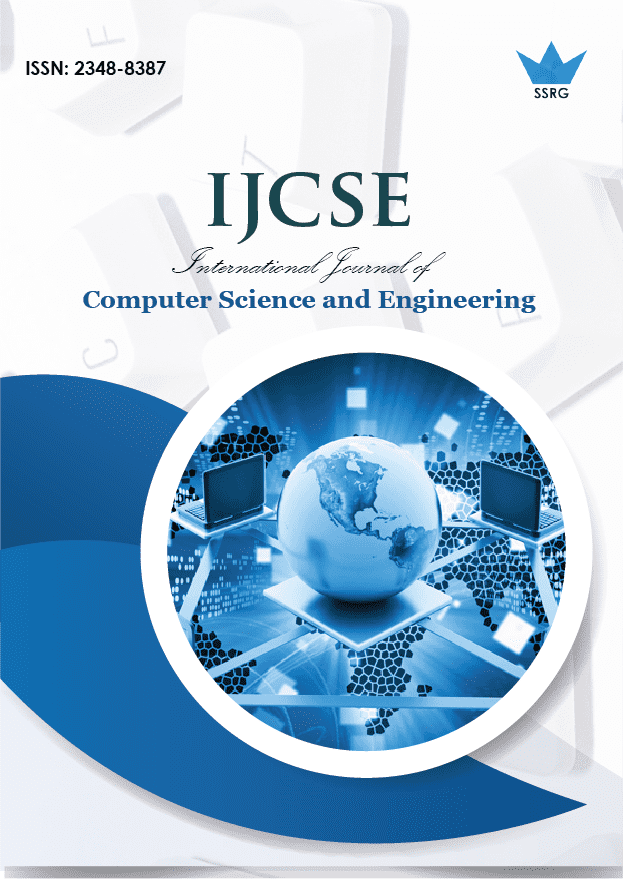An Enhanced Quality of Service Based He-DQG Algorithm for Heterogeneous Cloud Environment

| International Journal of Computer Science and Engineering |
| © 2016 by SSRG - IJCSE Journal |
| Volume 3 Issue 4 |
| Year of Publication : 2016 |
| Authors : S.Catherine Mary, T.Bavithra Devi |
How to Cite?
S.Catherine Mary, T.Bavithra Devi, "An Enhanced Quality of Service Based He-DQG Algorithm for Heterogeneous Cloud Environment," SSRG International Journal of Computer Science and Engineering , vol. 3, no. 4, pp. 1-4, 2016. Crossref, https://doi.org/10.14445/23488387/IJCSE-V3I4P102
Abstract:
A secure and efficient way to provide computing services to users on cloud computing has become more and more popular. Cloud computing in a heterogeneous environment offers a rapidly and on-demand wide range of services to the end users. Previously single long-term renting scheme is usually adopted to configure a cloud platform. Profit is regarded as most important factor obtained from the point of view of cloud service providers’ and it is especially determined by the configuration for a cloud service platform under the given market demand. Novel double quality guaranteed renting scheme is proposed that guarantee the QOS for the customers and also it maximizes the profit of the service providers. Heterogeneous Double-Quality- Guaranteed (He- DQG) renting scheme can achieve more profit than the compared Single-Quality-Unguaranteed (SQU) renting scheme in the premise of guaranteeing the service quality completely. Usually, a long-term renting with short-term renting, is used for configuring a cloud platform that cannot guarantee the quality of service requirements under the varying system workload, but also reduce the resource waste greatly. In this paper, firstly a double resource renting scheme is designed in which short-term renting and long-term renting were combined by aiming at the issues of existing one.
Keywords:
Cloud computing, Heterogeneous Double-Quality-Guaranteed (He-DQG), Single- Quality-Unguaranteed (SQU, virtual machine (VM).
References:
[1] Jing Mei, Kenli Li, Member, IEEE, Aijia Ouyang and Keqin Li, Fellow, IEEE pp 1-8. TRANSACTIONS ON COMPUTERS, VOL. *, NO. *, * 2015
[2] Harikrishnan Natarajan, SSRG-IJCSE pp 2-3. Truthful bidding for cloud resources based on compettitve cloud auction, costing and depreciation , Volume 3, Issue 3, March 2016 .
[3] Avilash Roul E, SSRG-IJCSE pp 3-4,pricing method in cloud computing, Volume 3, Issue 1, January 2016.
[4] Swapna Lia Anil and Roshni Thanka “A Survey on Security of Data outsourcing in Cloud,” International Journal of Scientific and Research Publications, Volume 3, Issue 2, February 2013 .
[5] Y. Deswarte, J.-J. Quisquater, and A. Saïdane “Remote integrity checking,” in Proc. 6th Working Conf. Integr. Internal Control Inf. Syst. (IICIS), 2003, pp. 1–11.
[6] Yongjun Ren, Zhenqi Yang, Jin Wang and Liming Fang “Attribute based Provable Data Possession in Public Cloud Storage,” Intelligent Information Hiding and Multimedia Signal Processing (IIHMSP), 2014.
[7] G. Ateniese “Provable data possession at untrusted stores,” in Proc. 14th ACM Conf. Comput. Commun. Secur. (CCS), New York, NY, USA, 2007, pp. 598–609.
[8] Giuseppe Ateniese, Randal Burns, Reza Curtmola, Joseph Herring, Osama Khan, Lea Kissner, Zachary Peterson and Dawn Song “Remote Data Checking Using Provable Data Possession,” ACM Transactions on
[9] Information and System Security, Vol. 14, No. 1, Article 12, Publication date: May 2011.
[10] F. Seb´e, J. Domingo-Ferrer, A. Martinez-Balleste, Y. Deswarte, and J.-J. Quisquater, “E cient remote data possession checking in critical information infrastructures,” IEEE Trans. on Knowl. and Data Eng., vol. 20, no. 8, 2008.

 10.14445/23488387/IJCSE-V3I4P102
10.14445/23488387/IJCSE-V3I4P102